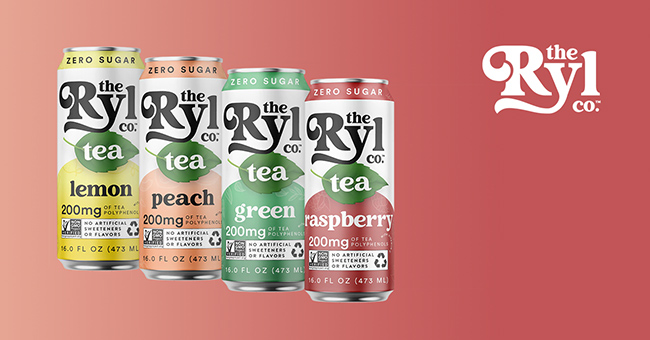As a beverage industry professional, Blodin Ukella worked for other founders to market brands aligned with the health and wellness trend. Now that he’s launching a tea venture of his own, the first-time CEO is looking to make some Ryl change.
The Ryl Company (pronounced like ‘real’) produces a line of functional teas in 16 oz. aluminum cans. The drinks are Non-GMO Project verified and each serving contains 200 mg of tea polyphenols, 18 mg of Vitamin C and zero sugar. Founded by Ukella, former chief strategy officer at protein drink brand OWYN, the brand aims to be a better-for-you tea option in a category where many of its competitors – even clean label or organic brands – still contain significant amounts of sugar.
The New Jersey-based startup’s four-SKU line – featuring Green, Lemon, Peach and Raspberry flavors, which are sweetened with a blend of monk fruit and stevia – began selling direct-to-consumer online this month for $34.99 per 12-pack. The line is now rolling out to retail in the Northeast with Wegmans and select Whole Foods stores, while a nationwide Sprouts launch and an expansion with Wakefern are planned for later this year.
“What we wanted to do from a beverage standpoint is we wanted to create a Gen Z, millennial-friendly brand, because those are the ones that are focused on wellness from an over-indexing standpoint,” Ukella said. “And we wanted to bring it to a much higher frequency occasion and tea is a high velocity, high frequency occasion.”
Whereas some iced tea brands have attempted to downplay or minimize the amount of polyphenols – a family of naturally occurring and often functional plant compounds – due to their astringent taste, Ryl is making them the hero ingredient. The company has employed a proprietary formula blend and manufacturing process to ensure quality taste while controlling the dosage of each type of polyphenol in each drink.
The teas contain 100 mg of catechins, which have antioxidant properties, including 60 mg of EGCG, which can reduce inflammation and potentially help prevent disease, among other benefits.
The use of 16 oz. cans, meanwhile, supports the company’s sustainability initiatives and, Ukella said, is key to connecting with younger consumers who are increasingly rejecting plastic. Tall cans are far from a rarity in the tea set; AriZona has used the format for decades and brands such as Steaz, Seven Teas and, most recently, Liquid Death have also employed them. However, Ukella said cans’ recyclability also helps to convey a premium identity for environmentally minded shoppers.
The Ryl Company has raised $6.7 million in seed capital and Ukella has assembled a team of experienced beverage industry personnel to help lead the brand, including COO Ruben Rafaeli, VP of operations Alex Krutzke, key account manager Ryan Walsh, and controller James Gerbig.
A graduate of Rutgers Business School, Ukella was born in Kosovo and fled the country for the U.S. with his parents in the late 1990s during the Kosovo War – an experience he said gave him a positive and optimistic approach to life and business. He began his career in the beverage space as a data analyst for Bai Brands before joining plant-based protein brand OWYN in 2018 as its head of strategy, ultimately moving into the c-suite as chief strategy officer in 2021.
Although he didn’t disclose who was involved in the financing round, Ukella said the brand sought out strategic investors and “thought leaders” across multiple industries. The goal of the financing, he said, will be to establish healthy cash flow margins early into Ryl’s launch so that the company can reinvest revenue back into retail and distribution growth and innovation, ideally setting the company up to only seek future fundraising for growth initiatives, rather than sourcing working capital.
“The center place of our culture, and this came from my investment group, is that we never want to lose,” he said. “We don’t want to lose in the marketplace. We also don’t want to lose in the P&L and? the month end financials.”
The core of the business strategy, he added, is around “extremely deep, constrained execution” that is focused on seeding the brand in multiple retail channels in the Northeast while growing beyond that region through natural accounts. Through that approach, Ukella is also trying to rethink how startups approach the food and beverage business, suggesting that while Ryl’s focus on polyphenols may be a key differentiator, he doesn’t view the brand as “disruptive” but rather as “additive.”
“One thing I really want to tell people is, internally, we are on what we’re calling an ‘additive mission,’ or an ‘additive revolution,’” he said, highlighting an opportunity to draw in consumers from the better-for-you energy and plant-based categories, among other spaces, to drive incremental growth in the tea category.
